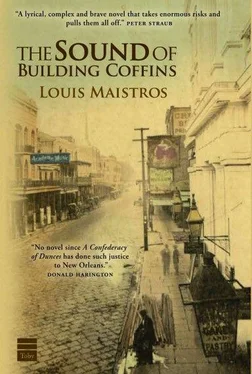She did not make note of static wind that scattered and swept away settled fog behind her as she walked, a wind that would soon erase everything she had ever known.
Chapter fifty-four. Keep My Baby Down
It was too late for Marcus to reinforce the brickwork covering Maria’s grave. The mortar of it had long since crumbled in places, many bricks loosened by time and a few missing altogether. He had some supplies stored in the small caretaker’s shack at the cemetery’s edge, but there would be no time for mortar to dry and take hold-large raindrops had already begun to slap the earth at a steep angle.
The wind whipped ferociously and the rain intensified in kind. A pecan tree thirty yards off creaked against a howling gust, shedding pecans that shot like bullets through the air alongside sheets of horizontal rain that stung Marcus’ neck like wasps. He lowered to his knees but didn’t fall. Stone and wooden markers toppled or flew from graves and water began to collect in animated puddles that indicated where the ground lay lowest. Marcus placed his hands upon the hard red clay above Maria, kissed the brick nearest where her head would be. “Stay down, baby,” he whispered.
There was not much that he could do, but he could not do nothing. Crouching low, he hurried to the caretaker’s shack, the wind ushering him along with such power that his legs barely kept up with his body. Relative calm inside was short-lived, as the shack’s lone window, blurry and shaking from pounding rain, suddenly exploded-a two-foot plywood crucifix crashing through and spraying Marcus with hard water and shards of glass. Quickly regaining his bearings, Marcus grabbed the can of white paint he’d come for and pushed through the door once more, walking into and against the direct force of the storm.
Returning to her grave he noted a few bricks had already broken free and tumbled away, but the water had not yet risen to cover her. Kneeling with the can between his legs, he pulled a small knife from his hip pocket, the same one he’d used to cut the fishing line. As he pried open the lid the knife flew from his grip.
He plunged his naked hand into the thick white paint, then withdrew it to smear a rough diagram over the bricks. The diagram was a veve , a Vodou symbol representing Erzulie Dantor, the spirit designated by Jesus Legba as protector from deadly storms. Upon its completion the paint can slipped free of him, flying over his head and streaking his face with white as it passed to join the knife.
Ten yards to his left was another grave, a newer grave, one with no bricks protecting its occupant from unwelcome resurrection. The marker was a rectangle of plain concrete:
Malvina Latour
1806-1906
Sister. Daughter. Mother to Many
Marcus leaned his hands into the mud above the mambo’s heart, let his soul feel all the rage he’d held in through the years. Shouted above the din of wind and rain:
“You listen to me, old woman. You done took my nose, you took my son, you made my life a shambles and done got even with me a hunnert times over. All that, and I never cursed your name, never bothered you not-one-damn-time, never sought revenge when I coulda done plenty, never spoke ill to or about you and never asked you fer nothin’. Well, I’m asking you this one time for just one thing, so listen up and listen good. Keep my baby down in this comin’ flood. Hear me now, old woman. You do this thing and we’re even. You don’t and I’ll curse yer name to the heavens, God as my witness, till my dyin’ breath and after. Keep my baby down. She my baby but she your kin by blood, so do right by her. I already lost my son’s body to the water-ain’t found him yet and might never do-but not her, oh no, not her. I won’t have it, you hear? Not to the water, not her. Keep my baby down. I’m beggin’ you to please keep her down, keep her down, keep her down…”
The grave next to Maria’s, slightly lower and without bricks, was already topped with a half-inch sheen of moving water. Its stone, freshly slanted from push of wind, stated simply:
Frances Latour
1818-1853
Beloved Mother to Maria
Chapter fifty-five. How Long to Return?
By twenty past five Malaria was stone drunk, the storm outside humming smoothly like a seashell in her ears.
“C’mon, papa. I’m good fer it,” she said with a flutter of lashes to the bartender who’d cut her off, a dapper fellow known to regular patrons of the Eagle Saloon as Gary the Gent. “Y’know I’m good fer it, Gary.”
“Yeah, you good, baby. But no cash, no flash. Can’t go runnin’ this tab straight up to the moon, now.”
“Hell, Gary, you ain’t no gent.”
“You know you love me, baby,” he laughed. “All wounds heal with time, as they say.”
A strong gust slammed something heavy against the side of the building.
“ Damn ,” flinched Gary. “Don’t sound like this shit anywhere near ta passin’.”
Malaria wrinkled her nose nervously. “Guess I should get on up for my shift.” A flash of perfect teeth. “See you in ten hours, baby.”
“Knock ’em dead, sweetheart. Knock ’em right on out.”
“You know it.” Malaria blew him a kiss as she staggered towards the stairs, offering a drunken ass-wiggle to make up for not having tipped. Gary knew about Malaria’s hard luck this past week and so never-minded the stiff, but he did appreciate the show.
“Damn, baby,” he said with a grin. She smiled at the compliment.
At the top of the stairs she gave Black Benny a touch on the shoulder and a peck on the cheek. “What’s shakin’, sugar bear?”
Benny grunted. “What’s shakin’ is you been downstairs all day gettin’ yerself shitcanned and still can’t help but drag yer ass in late as usual.”
“Oh pooh,” she deflected with a pout, as she kept on towards the bar. Black Benny grunted once more before directing a worried eye to the pounding of water against glass.
Buddy’s band was up on the platform, sans Buddy, stomping out a lowdown gutbucket gospel blues called “Don’t Nobody Go Away” for a sparse crowd of degenerates and a scattering of whores that played cards and sucked back shots, defiantly hooting like hyenas each time the storm crescendoed menacingly outside with a slam or a bang or a wail.
Buddy had tried a few other horns since losing his old one, but when he couldn’t make any of them sing or shout the way he liked he lost heart and quit playing altogether. Sitting at the bar now with an early drunk on, Buddy winced into his glass at the noise made by some kid called Tig, his replacement, chosen seemingly at random from a legion of wanna-bees by that lousy turncoat bastard Frankie Dusen. Frankie had been Buddy’s longtime trombone player, a good old pal and partner for all those years, but had taken over the band a mite enthusiastically in Buddy’s opinion. Almost like he’d been hoping for the chance.
“Step it up, dammit!” Buddy bellowed from the bar. “I learned y’all better ’n that. Keep it poppin’. This ain’t no fuckin’ funeral.”
Frankie grudgingly obliged, stomping out a quicker rhythm till the band caught up.
Buddy spotted Malaria from the corner of his eye, turned to give her a timid smile and wave. She smiled back.
Malaria smiled back because she didn’t know Buddy had killed her sister. Couldn’t conceive of it. The cops hadn’t done much, their investigation amounting to a shrug of shoulders over another dead whore killed, presumably, by another rogue sailor on shore leave. These things happened. There’d been rumors about Buddy’s involvement, but Diphtheria’s best friend Hattie Covington had supplied his alibi-telling the cops he’d been busy fucking her six ways from Sunday on the night in question. That was enough for the cops and enough for Malaria, too. No way Hattie would tell tales out of school about the murder of her very best friend. Even Buddy wasn’t that charming, or so she believed.
Читать дальше












